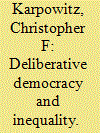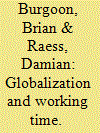|
|
|
Sort Order |
|
|
|
Items / Page
|
|
|
|
|
|
|
| Srl | Item |
| 1 |
ID:
092870


|
|
|
|
|
| Publication |
2009.
|
| Summary/Abstract |
Deliberative democracy grounds its legitimacy largely in the ability of speakers to participate on equal terms. Yet theorists and practitioners have struggled with how to establish deliberative equality in the face of stark differences of power in liberal democracies. Designers of innovative civic forums for deliberation often aim to neutralize inequities among participants through proportional inclusion of disempowered speakers and discourses. In contrast, others argue that democratic equality is best achieved when disempowered groups deliberate in their own enclaves (interest groups, parties, and movements) before entering the broader public sphere. Borrowing from each perspective, the authors argue that there are strong reasons to incorporate enclave deliberation among the disempowered within civic forums. They support this claim by presenting case study evidence showing that participants in such forums can gain some of the same benefits of deliberation found in more heterogeneous groups (e.g., political knowledge, efficacy and trust), can consider a diversity of viewpoints rather than falling into groupthink and polarization, and can persuade external stakeholders of the legitimacy of the group's deliberations.
|
|
|
|
|
|
|
|
|
|
|
|
|
|
|
|
| 2 |
ID:
092869


|
|
|
|
|
| Publication |
2009.
|
| Summary/Abstract |
This article challenges popular wisdom that economic globalization uniformly increases working time in industrialized countries. International investment and trade, they argue, have uneven effects for workplace bargaining over standard hours and over work-time flexibility, such as use of temporary or fixed work contracts. The authors explain how such globalization will tend to more substantially decrease standard hours than it does work-time flexibility. And they explain how works councils and union-led collective bargaining alter the way globalization affects both aspects of working time.The analysis of German enterprise data supports these expectations. Measures of globalization diminish standard working hours but yield more temporary work, fixed-contract work, and flexible working arrangements. Works councils and collective bargaining, however, mediate these effects in contrasting ways. Among enterprises without works councils or collective agreements globalization triggers more standard hours, but among firms with such representation globalization triggers fewer hours. With respect to flexibility, however, globalization increases use of temporary or fixed-term contracts more strongly where works councils or collective bargaining are present than when they are not. In short, economic openness has uneven consequences for working time, and firm-level labor representation channels those consequences in ways that highlight political agency in how people respond to globalization.
|
|
|
|
|
|
|
|
|
|
|
|
|
|
|
|
| 3 |
ID:
092868


|
|
|
|
|
| Publication |
2009.
|
| Summary/Abstract |
The conventional wisdom holds that U.S. political institutions are inhospitable to industrial policy. The authors call the conventional wisdom into question by making four claims: (1) the activities targeted by industrial policy are increasingly governed by decentralized production networks rather than markets or hierarchies, (2) "network failures" are therefore no less threatening to industrial dynamism than market or organizational failures, (3) the spatial and organizational decentralization of production have simultaneously increased the demand and broadened the support for American industrial policy, and (4) political decentralization is therefore likely to improve the functioning of industrial policies designed to combat network
|
|
|
|
|
|
|
|
|
|
|
|
|
|
|
|
| 4 |
ID:
092867


|
|
|
|
|
| Publication |
2009.
|
| Summary/Abstract |
This manuscript departs strongly from conventional accounts that ascribe a central role to war and the threat of war in Third World state building. Similarly, it challenges the conventional wisdom that abundant exportable natural resource wealth is likely to provoke institutional atrophy. Instead, it argues that a set of logically prior conditions-the social relations that govern the principal economic sectors and the pattern or intraelite conflict or compromise-launch path-dependent processes that help determine when, and if, either strategic conflict or resource wealth contribute to, or impede, institutional development. The argument is tested in the comparative analysis of the state-building process in two Andean neighbors (Chile and Peru), both of which are situated in similar strategic and natural resource environments but which produced qualitatively different outcomes in terms of state capacity or "strength."
|
|
|
|
|
|
|
|
|
|
|
|
|
|
|
|
|
|
|
|
|